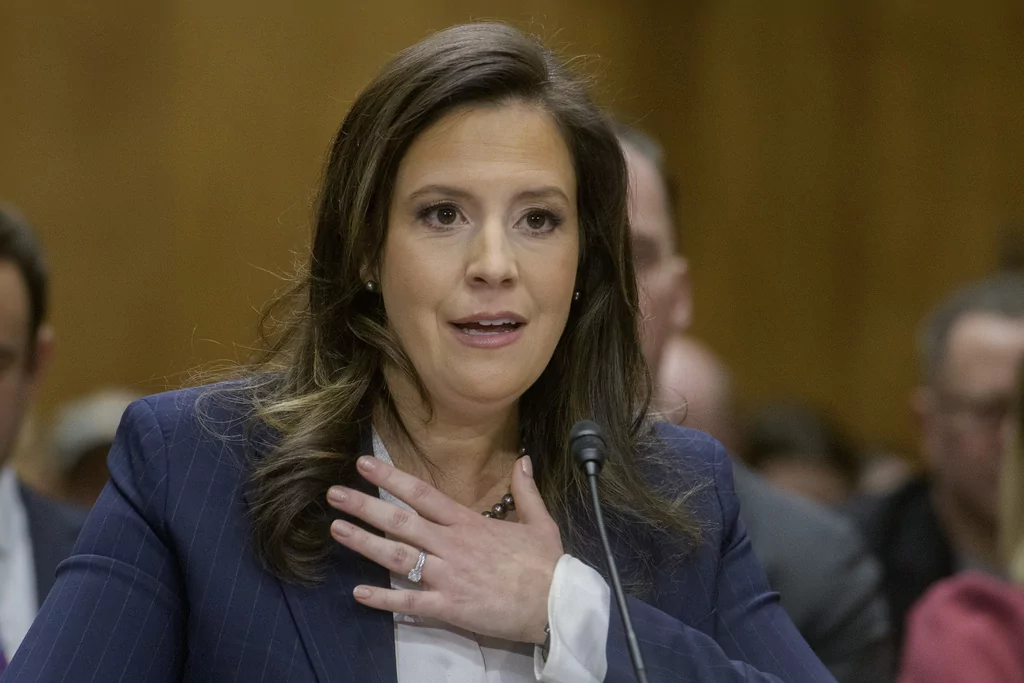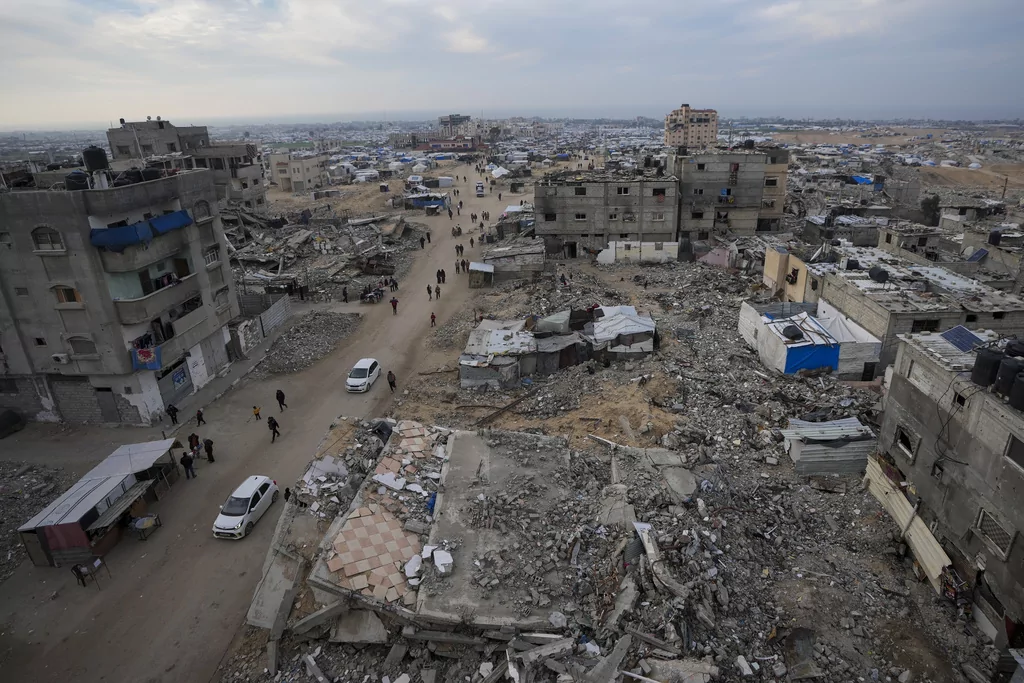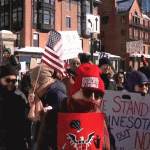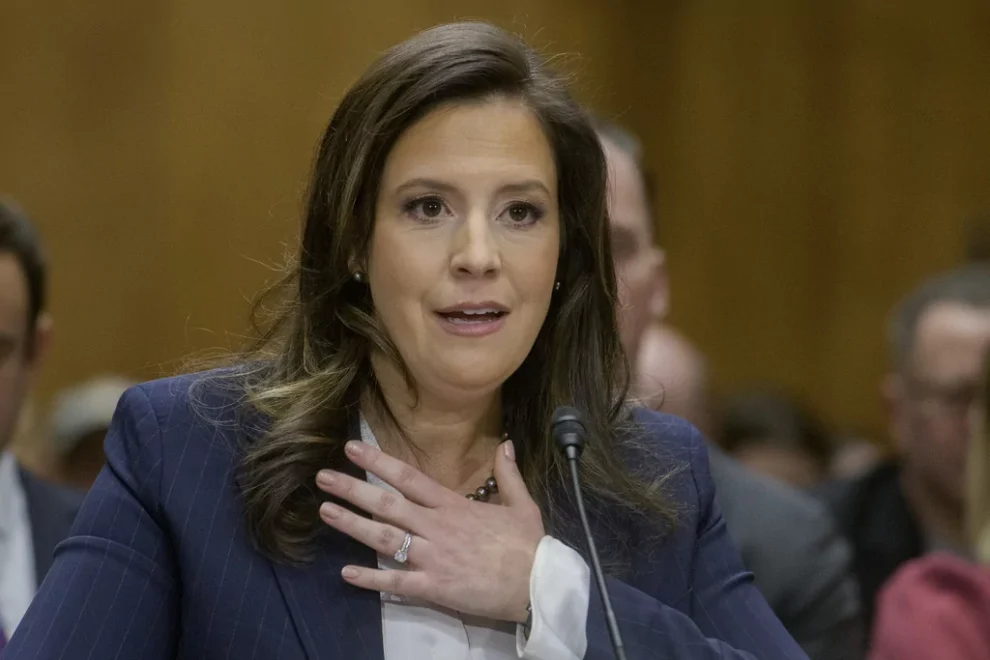President Donald Trump’s pick to be the next U.S. ambassador to the United Nations, Rep. Elise Stefanik (R-NY), did not mince her words in front of the Senate Foreign Relations Committee last week when she accused the organization of suffering from “antisemitic rot.”
“If you look at the antisemitic rot within the United Nations, there are more resolutions targeting Israel than any other country, any other crisis, combined,” Stefanik said at her confirmation hearing on Tuesday.
“We need to be a voice of moral clarity on the U.N. Security Council and at the United Nations at large — for the world to hear the importance of standing with Israel,” she continued.
Stefanik’s likely appointment will shine an uncomfortable light on long-perceived accusations of anti-Israel and antisemitic bias at the institution. This perception has been all the more acute since the devastating Oct. 7, 2023, terrorist attacks.
“The combo of Trump and Stefanik will seek to be an aggressive disrupter of the status quo, and some of that status quo needs to be upended for sure, like some of the deep problems that are endemic in some of those institutions,” Brian Katulis, an expert with the Middle East Institute, told the Washington Examiner. “But the real risk here is that if they disrupt without actually having a clear, pragmatic plan about what” comes after.

Israeli Prime Minister Benjamin Netanyahu called the international body a “house of darkness” and “swamp of antisemitic bile” during an address at the U.N. General Assembly in September.
“The singling out of the one and only Jewish state continues to be a moral stain on the United Nations,” he said. “It has made this once-respected institution contemptible in the eyes of decent people everywhere.”
Nikki Haley, who served as ambassador to the U.N. for part of the first Trump administration, wrote in 2023 that she “confronted” antisemitism “every day at the United Nations.”
“And I know that the Jew-haters try to hide it by saying they only hate Israel,” Haley said in her Jerusalem Post op-ed. “All it takes is 24 hours at the U.N. to realize that anti-Zionism is just a modern name for the ancient evil of antisemitism.”
In 2024, the U.N. General Assembly adopted 14 resolutions that singled out Israel and only seven resolutions on the rest of the world, U.N. Watch, a pro-Israel nonprofit organization dedicated to monitoring the U.N., said in November. From 2015 through 2023, the U.N. General Assembly adopted 154 resolutions against Israel and 71 against other countries, per the report. Israel’s growing isolation at the U.N. over the course of the war was fully on display when Spain, Norway, and Ireland unilaterally recognized Palestinian statehood.
The relationship between Israeli leaders and U.N. Secretary-General Antonio Guterres has also deteriorated over the course of the war. Last October, Israel barred Guterres from entering the country, arguing he had not clearly condemned Iran’s missile barrage targeting Israel.
“Anyone who cannot unequivocally condemn Iran’s heinous attack on Israel, as nearly all the countries of the world have done, does not deserve to set foot on Israeli soil,” Israel Katz, who was foreign minister and is now defense minister, said at the time. “Israel will continue to defend its citizens and uphold its national dignity with or without Antonio Guterres.”
U.N. officials have repeatedly pushed back on Israel’s allegations that there is an antisemitism problem within their offices and staff, arguing instead that their concern is of a humanitarian nature for the Palestinian people. As recently as last week, the United Nations Alliance of Civilizations released an extensive plan to address antisemitism globally titled, “United Nations Action Plan to Enhance Monitoring and Response to Antisemitism.”
One aspect of the plan calls for U.N. staff members to undergo training to “enable them to recognize and understand antisemitism (including Holocaust denial and distortion) for the purpose of enhancing monitoring and reporting mechanisms” that should “draw on the experiences and perspectives of Jewish communities and a victim-centered and rights-based approach.”
The tip of the antisemitism iceberg, as Israel and its defenders believe, is the UN Relief and Works Agency for Palestinian Refugees, or UNRWA.
The U.N. created UNRWA in 1949 to facilitate the displacement of Palestinians during the establishment of the Jewish state. As a result, it has overseen relief efforts in the region for decades. The agency funds and operates programs for education, disaster response, and healthcare in Gaza and the West Bank. It employs approximately 13,000 people, most of them Palestinian.
But the relationship between Israel and UNRWA was irreparably damaged when it came to light that multiple personnel within UNRWA were accused of providing cover for Hamas or being complicit in the Oct. 7 massacre.
UNRWA spent months investigating workers within its ranks accused of aiding the attacks. A high-level investigation by the United Nations Office of Internal Oversight Services in 2024 found that nine employees participated in the Oct. 7 attacks. The OIOS found insufficient evidence against a further 10 individuals accused by the Israeli government.
Israel argued that the number of UNRWA officials who were involved, directly or indirectly, was much higher.
“UNRWA has failed in its mandate as an independent humanitarian organization. It has become overrun by terrorism and has been unable to prioritize the education and well-being of Gazans in need over hate and violence,” Israel’s U.N. Ambassador Danny Danon told U.S. News and World Report. “Israel will not work with agencies that foster terrorism over peace. Israel will work with agencies inside the U.N., like WHO and UNDP, that advance the needs of Gazans.”
Katulis warned that if Israel does not have an adequate replacement for the services UNRWA provides to Palestinians, it could create conditions in Gaza that are more favorable for Hamas.
If “there’s nobody that really is providing basic services [for Palestinians], that creates an opening for Hamas, though devastated, down and out is not completely gone,“ he stressed.
Israel has not fully endorsed a plan for who will govern Gaza in the long term, but officials are adamant about ensuring Hamas is not a part of that governing entity. The lack of a clear alternative has already provided the group with the opportunity to restart certain services for civilians since the ceasefire went into effect.

The U.N. maintains that the personnel who participated were just a few bad apples and that the services UNRWA provides, especially in the middle of the war, are essential for Palestinians.
Israel and U.S. officials say there are other U.N. agencies that could fill the void and don’t have alleged ties to Hamas, though UNRWA Commissioner General Philippe Lazzarini disagrees about the difficulty of replacing the services UNRWA provides.
The most recent blow to UNRWA’s credibility came last Sunday, when three Israeli women taken as hostages during the Oct. 7 attack were released after 15 months in captivity.
Romi Gonen, Emily Damari, and Doron Steinbrecher claimed to have been held in one of eight camps in Gaza operated by UNRWA. The U.N. called the alleged testimony “a very serious allegation” and promised to look into the matter.
Farhan Haq, deputy spokesman for the office of the U.N. secretary-general, told Jewish News Syndicate that any time the U.N. has “received information on the misuse of facilities,” the organization has “followed up with investigations.”
“It is unclear at this stage whether the shelters were among those that had been abandoned during the fighting, so we’d need further knowledge about that and other aspects of what happened,” he added.
Israel has undertaken an extensive effort to stop UNRWA’s efforts. On Tuesday, the day after International Holocaust Remembrance Day, Israel is set to enforce a ban on the agency from operating within its borders.
There have also been various attempts over the years to get Israel pushed out of the international body, most recently by controversial U.N. official, Francesca Albanese, the U.N.’s special rapporteur on the occupied Palestinian territories.
Albanese has long faced allegations of antisemitism, including from the Biden administration, and she has frequently accused Israel of conducting genocide against the Palestinian people. Linda Thomas-Greenfield, the outgoing U.S. ambassador, charged that Albanese is “unfit for her role” and that the U.N. “should not tolerate antisemitism from a U.N.-affiliated official hired to promote human rights.”
But the underlying tensions between Israel and the U.N. date back decades. The 1975 “Zionism is Racism” General Assembly resolution was an early flashpoint. Seventy-two countries voted in favor of the resolution that condemned Zionism as “a form of racial discrimination,” while the U.S. was among only 35 countries that voted against it. Thirty-two countries abstained. Then-U.S. Ambassador Daniel Patrick Moynihan criticized the “infamous act” at the time.
CLICK HERE TO READ MORE FROM THE WASHINGTON EXAMINER
The U.N. voted in 1991 to repeal the resolution, with 111 nations in favor of repealing the statement and 25 nations voting against.
Stefanik, during her confirmation hearing, referenced Moynihan’s comments, saying they demonstrated “the type of leadership that I hope to bring if confirmed to the United Nations.”
























